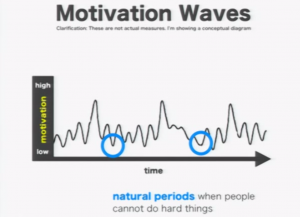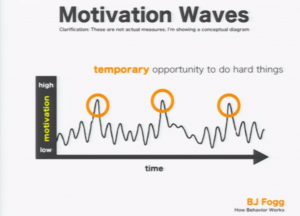Have you ever lost your motivation to write?
You have a deadline staring you in the face, and no words to reach it.
Feels awful, doesn’t it?
People love talking about motivation.
The truth is, there’s some great content out there about getting motivated.
But asking “How do I motivate myself?” misses a critical point:
What do you do when you’re motivated?
How do you turn motivation into productivity? Tweet
And more importantly, how do you harness motivation to ensure that you stay productive later?
In effect: how to write even when you’re not motivated?
These may sound like silly questions, but here’s the truth: most writers leave hundreds, even thousands, of pages unwritten each year because they’re not using their motivation the right way.
Here’s how to ensure this doesn’t happen to you.
It’s a fascinating psychological concept that will change the way you work – forever.
You Can’t Always Control Motivation, But You Can Control How You Use It
BJ Fogg, head of the Stanford Persuasive Technology Lab, constructed a model for motivation that he calls the motivation wave.
The idea is that motivation isn’t constant; it ebbs and flows in waves.
Most of the time, our motivation is pretty low.

At such times, doing hard things – like writing a blog post that’s interesting and useful to your readers – is really hard.
But sometimes, because of a number of unpredictable factors – maybe you read an inspirational story, have an uplifting talk with a mentor, or just wake up feeling amazing – your motivation spikes.

And that’s when you feel as if you can do just about anything.
The Mistake Most Writers Make
What do you usually do when you’re feeling super-motivated?
If you’re like most people, you try and power through as much work as possible, writing page after page after page with reckless abandon.
But eventually, your motivation subsides, and once again, you’re having trouble just getting started.
Use This Simple Strategy to Write More Every Day
By using your motivation strategically, you can actually accomplish a lot more.
When motivation spikes, Fogg suggests we should harness it to do the things that “structure future behavior.”
What does this mean?
In a presentation at a health-tech conference, Fogg gave the example of someone trying to get fit.
Instead of simply doing extra workouts, when they are at peak motivation, they should do the things that will make working out easier when they’re not as motivated. For example, buying running shoes, or hiring a personal trainer and scheduling sessions with them.
This makes doing the actual workouts much easier, so the actual workout can be done even when motivation is low.
We can apply the same principles to writing.
You may find that the hardest part of creating blog posts isn’t writing them; it’s the research and outlining you have to do first. Once you have that, it’s relatively easy to fill in the existing sections and rewrite from there.
So if you’re extra-motivated, instead of spending your day writing four blog posts from start to finish, research and outline ten posts.
Later, even though your motivation levels might be lower, you can do the (relatively) easier work of writing the content.
Makes sense, doesn’t it?
Here’s another example, this time from my past life as a copywriter.
Years ago, I wrote sales pages for clients. Dozens of them every month.
As my business grew, it started getting harder to keep up. I began to see my to-do list as a callous monster.
Me: C’mon! I can’t be at 100% every single day. It’s crushing me.
To-Do List: I don’t care. Look at me! Do you see how long I am? Shut up and get back to work.
Me: Okay 🙁
(As it turns out, one of the side effects of burnout is being weird and talking to your to-do list.)
I began to test a new approach. On the days I was feeling “on,” I wouldn’t actually write that many sales pages.
Instead, I would focus on the three things I consider the most important elements of a sales page.
- Headlines
- Subheads
- Calls to Action
I would write all the headlines, subheads and CTAs for a page, and then put it away and move on to the next one, and the next one, and so on.
Sometimes, I’d get through ten pages a day in this way.
Through the rest of the week, the work was much easier.
I just took the outline I’d already written, and filled in the rest.
Of course I did a lot of rewriting too, but the important thing was that the hardest part was already done. The rest of it wasn’t such a big deal, and didn’t depend on how motivated (or unmotivated) I was.
Granted, I hadn’t even heard of motivation waves then, but building that system started me on a long road of exploring productivity, time management and work-life balance.
It helped me write thousands of pages of different types of content over the years.
It can do the same for you.
Do This Now
Look at your to-do list.
What do you have to write in the next few weeks?
Break up that list into two categories: hard tasks (the ones that will structure your future behavior) and easy tasks (the ones you can do even when your motivation is low).
While the tasks that are easy or hard for you will vary depending on your individual strengths as a writer, use these examples as a guideline.
Examples of “Hard” Tasks
- Coming up with great content ideas
- Writing irresistible headlines
- Building outlines for your posts, chapters, books and guides
- Writing the first line of any writing project
- Distilling a complex idea into simple, readable copy
- Buying a writing course, training, or other personal development resource
Examples of “Easy” Tasks
- Using your outline to write body copy
- Searching online to find research to back your writing
- Revising your latest draft
- Proofreading
- Breaking up your to-do list into “hard” and “easy” tasks
The secret is to ride your natural motivation wave and use it productively. This means making decisions about what to work on at different levels of motivation.
This simple act will help you break down your barriers to productivity, and accomplish more every single day.
How do you tackle lack of motivation? Let me know in the comments.
















